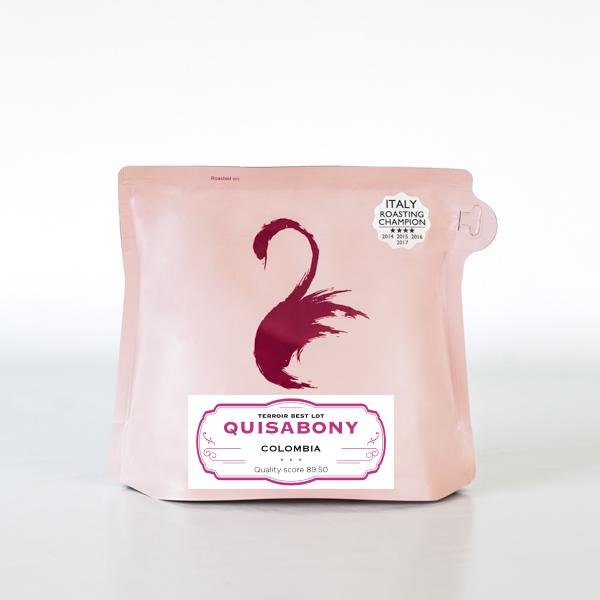CUP SCORE 89.50 (SCA cup protocol)
*Terroir Best Lot*
Tangerine / Raspberry / Caramel / Green grape / Pear
suggested for espresso and filter
PLEASE NOTE
We roast to order all coffees on Wednesday and Saturday, dispatching on next working day. Cut-off time is 8am UTC+1
Technical detail
Quisabony family Colombia
Producer Country
Huila 1700 mt
Wet (washed) Pink Huila heirloom
October 16 April 17
660 kg GrainPro bags
Lot size Arrived in
Self-made
Rubens Gardelli drum roaster
Roast profile by Roasted on
THE STORY BEHIND
When we blind tasted this lot among 17 different Colombia new-crop lot, we immediately knew it was going to be one of our favourite for 2017, getting into the special category of *Terroir Best Lot*. Later we found it is from a special Pink (or orange) heirloom Huila variety, and that's even more exciting!
We want to share with you the story from the sourcer of this amazing lot: "I met a farmer in Huila who helps small producers and he knew where to find Pink Bourbon. He took me to this mountain in Acevedo which was very humid and cold. I felt it was the best environment for coffee which I found in Huila. We met the Quisabony family which were growing Pink Bourbon and I noticed the trees did not look at all like a Bourbon. They also said that it is tolerant of leaf rust, tolerant, not completely resistant. I started asking how they got the seeds and they said that back in the 1950s there was an experimental farm in the area, that it looked like a cemetery because there were all these crosses which marked each variety. They had many varieties. The farm was abandoned and the local people would go to the farm to get seeds. This is where they said they took themselves the Pink Bourbon. After talking with other people, some say it is an Ethiopian heirloom and others said it is a mutation of one of the early experiments with the Colombia variety.
THE FERMENTATION PROCESS
Washed coffees focus solely on the bean. They let you taste you what’s on the inside, not the outside. Washed coffees depend almost 100% on the bean having absorbed enough natural sugars and nutrients during its growing cycle. This means the varietal, soil, weather, ripeness, fermentation, washing, and drying are absolutely key.
Washed coffees reflect both the science of growing the perfect coffee bean and the fact that farmers are an integral part of crafting the taste of a coffee bean. When looking at washed coffees, it becomes apparent that the country of origin and environmental conditions play a vital role in adding to the flavour.
During wet processing, the pulp (i.e.the exocarp and a part of the mesocarp) is removed mechanically. The remaining mesocarp, called mucilage, sticks to the parchment and is also removed before drying. During this process, the sugars present in the mucilage are removed through natural fermentation or mechanical scrubbing. Mucilage is insoluble in water and clings to parchment too strongly to be removed by simple washing. Mucilage can be removed by fermentation followed by washing or by strong friction in machines called mucilage removers. Fermentation can be done by stacking the coffee outside or placing them under water and allowing nature to take its course. After the sugars are removed, the beans then can be taken through a secondary washing to remove any additional debris, or taken immediately to the patios or beds for drying.
We welcome wholesale partners!
If you're a retail store or coffee shop, please
Contact Us for more information on any of the coffees you see here.







